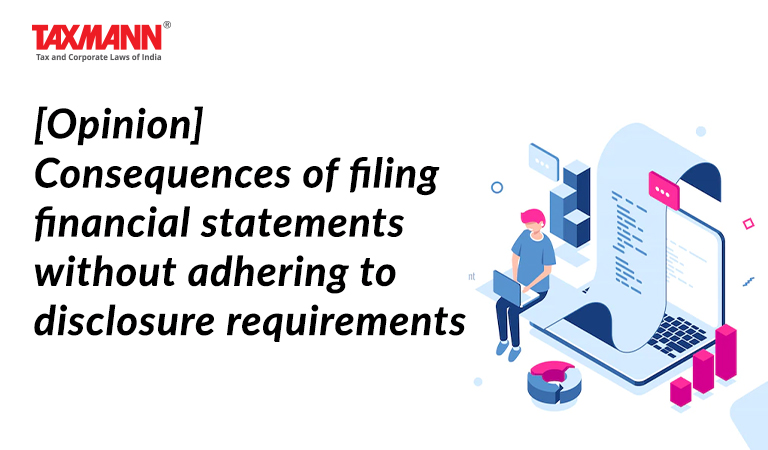[Opinion] Consequences of filing financial statements without adhering to disclosure requirements
- Blog|News|Company Law|
- 2 Min Read
- By Taxmann
- |
- Last Updated on 28 November, 2022

[2022] 145 taxmann.com 158 (Article)
1. Financial statements
Financial statements are written records that convey the business activities and the financial performance of a company and the financial statements are audited by statutory auditors appointed by the shareholders of the company and in the case of Government companies, the financial statements are audited by the Comptroller and Auditor General of India (CAG) in order to ensure accuracy and for tax, purposes.
1a. Notes to financial statements are the supplemental notes that are included with the published financial statements of a company. The notes are used to explain the assumptions used to prepare the numbers in the financial statements, as well as the accounting policies adopted by the company. They help different types of users, such as shareholders, financial analysts and investors, to interpret all the numbers added to the financial statements. Investors and financial analysts rely on financial data to analyse the performance of a company and make predictions about the future direction of the company’s stock price.
2. Financial statements are not complete without the notes to financial statements
The notes to the financial statements are a required being the integral part of a company’s external financial statements. They are required since not all relevant financial information can be communicated through the amounts shown (or not shown) on the face of the financial statements. The notes to the financial statements communicate information necessary for a fair presentation of financial position and results of operations that is not readily apparent from, or not included in, the financial statements themselves.
3. Filing of financial statements with the Registrar of Companies
Sub-section (1) of section 137 of the Companies Act 2013, provides that one copy of the financial statements, including consolidated financial statement, if any, together with all the documents which are required to be or attached to such financial statements shall be filed with the Registrar of Companies after they are duly adopted at the annual general meeting of the company.
Such statements are required to be filed within thirty days of the date of the annual general meeting. Rule 12 of Companies (Accounts) Rules 2014 prescribes Form AOC-4 (for standalone statements) and AOC-4 CFS (for consolidated statements). It should be noted that separate forms are prescribed for filing in Extensible Business Reporting Language (XBRL) format. If the same is not filed within 30 days, they can be filed within further 270 days as specified under the first proviso to sub-section (1) of section 403 of the Companies Act 2013, with such additional fees as are prescribed in Rule 12 of Companies (Accounts) Rules 2014 read with the table of fees annexed to the Companies (Registration Offices and Fees) Rules, 2014.
It is very important to note that the word “financial statement” is defined in clause (40) of section 2 of the Companies Act 2013. The documents which are required to be annexed to the financial statement are notes forming part of the financial statement, auditor’s Report and board’s report as provided under sub-section (7) of section 134 of the Companies Act 2013.
Click Here To Read The Full Article
Disclaimer: The content/information published on the website is only for general information of the user and shall not be construed as legal advice. While the Taxmann has exercised reasonable efforts to ensure the veracity of information/content published, Taxmann shall be under no liability in any manner whatsoever for incorrect information, if any.

Taxmann Publications has a dedicated in-house Research & Editorial Team. This team consists of a team of Chartered Accountants, Company Secretaries, and Lawyers. This team works under the guidance and supervision of editor-in-chief Mr Rakesh Bhargava.
The Research and Editorial Team is responsible for developing reliable and accurate content for the readers. The team follows the six-sigma approach to achieve the benchmark of zero error in its publications and research platforms. The team ensures that the following publication guidelines are thoroughly followed while developing the content:
- The statutory material is obtained only from the authorized and reliable sources
- All the latest developments in the judicial and legislative fields are covered
- Prepare the analytical write-ups on current, controversial, and important issues to help the readers to understand the concept and its implications
- Every content published by Taxmann is complete, accurate and lucid
- All evidence-based statements are supported with proper reference to Section, Circular No., Notification No. or citations
- The golden rules of grammar, style and consistency are thoroughly followed
- Font and size that’s easy to read and remain consistent across all imprint and digital publications are applied



 CA | CS | CMA
CA | CS | CMA
